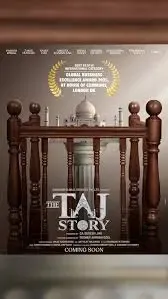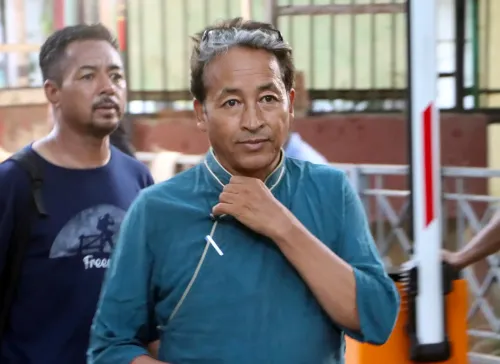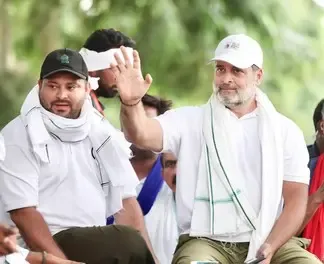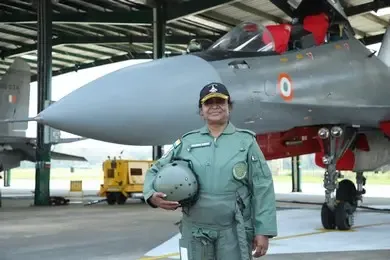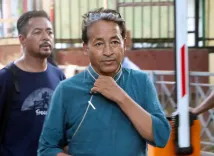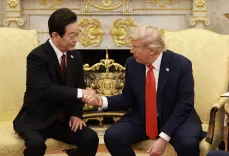What is the Significance of the United Nations on its 80th Anniversary?

Synopsis
Key Takeaways
- UN's 80th Anniversary signifies the need for continued relevance and reform.
- Expert insights stress the importance of funding and human resources in enhancing UN effectiveness.
- Diversity in leadership is crucial for a more representative UN.
- Ongoing dialogue about the UN's role highlights the complexities in global governance.
- Challenges like climate change and inequality require a redefined approach to development.
Sonipat (Haryana), October 28 (NationPress) The Jindal School of Government and Public Policy (JSGP) at the O.P. Jindal Global University (JGU) hosted a seminar to explore the significance of the United Nations on the occasion of the 80th Anniversary of the signing of the United Nations Charter, also referred to as the San Francisco Treaty.
This seminar featured distinguished experts in the field of international relations, faculty members from the Jindal School of International Affairs (JSIA) and JSGP, along with scholars and researchers from various schools within the JGU.
The keynote presentations were delivered by Dr. Deodat Maharaj from the UN Technology Hub for Least Developed Countries and Dr. Mitali Nikore from Nikore Associates.
In his introductory comments, Prof (Dr) Naresh Singh encouraged speakers to concentrate on the current relevance of the UN, rather than solely reflecting on historical contexts.
Dean Ramaswamy Sudarshan shared a comprehensive overview of the circumstances surrounding the establishment of the UN, highlighting its accomplishments, many of which remain unrecognized, as well as its well-documented shortcomings.
Prof Ambassador Mohan Kumar emphasized that member nations should proactively contribute funds and human resources instead of placing blame on the organization, whose core principles and structure have functioned effectively. He noted that entities like BRICS and G20 could play a vital role in addressing the imbalance in UN Security Council membership.
Dr. Maharaj noted that perspectives on the UN's relevance are often influenced by the geographical location of the observer.
In developed nations, the UN frequently faces criticism for the failures of the Security Council due to the veto power wielded by the five permanent members and is often disparaged for its diminishing budget and challenges related to human resources. In contrast, emerging economies such as those in the BRICS and G20 have a more nuanced perspective and can contribute both funding and human resources for UN reform, although permanent membership in the UNSC remains a contentious issue.
For many less developed countries, a strong role of the United Nations is crucial for development. Thus, for approximately 60% of the nations worldwide, the UN remains highly relevant.
Dr. Nikore shared her personal journey with the UN, recounting her childhood inspiration, her initial engagement with UN Women HQ, and her ongoing collaborations with various UN agencies, the World Bank, and the Asian Development Bank through Nikore Associates.
She argued that the UN can maintain its relevance by ensuring that it accurately represents the Global South, not just in project work but also in hiring practices at every level, including senior positions within headquarters and regional offices.
She stressed that a diverse leadership composition across all levels and regions will enhance the UN's representation and relevance in today’s world.
Prof Veselin Popowski suggested that the UN's ongoing significance could be achieved not only through reform initiatives like UN80 but also by drafting a new UN Charter, which includes a World Parliament that abolishes the temporary veto power granted to the victors of World War II and revitalizes the language and spirit of the UN Charter for future generations.
Prof Silvia Bottega pointed out that the extensive network of experts, projects, funds, and specialized agencies within the UN cannot be dismantled without jeopardizing global development, including in countries that are critical of the UN.
She emphasized that the reform process must encompass not only UNSC reform but also the reform of specialized agencies, necessitating an increase in budget and human resources.
Prof Naresh Singh concluded by summarizing the speakers' insights, arguing that the approach to development must evolve to address complexities and interdependencies, which would also enhance the UN’s relevance in light of ongoing challenges such as climate change, inequality, and conflict.
During the interactive Q&A session, attendees expressed appreciation for the speakers' insights and posed questions regarding UN reform initiatives, the potential for UNSC reform, and new funding and leadership avenues for the UN. The discussions revealed varied perspectives on the UN’s ongoing importance, yet there was consensus on the need for complexity and spirituality in the dialogue.
Prof Suraj Kumar remarked that the significance of the UN has been questioned and debated since its inception, and this conversation re-emerges nearly every decade, if not annually.
Eleanor Roosevelt, a key figure in the establishment of the UN and the role played by the United States, described the UN as a dream brought to life by a bureaucracy. While the dream remains eternally relevant, the bureaucracy must adapt and reform, not just through the UN80 Initiative but also in the mindsets of constituent organizations, funds, programs, and specialized agencies.
India hosts 28 UN agencies that struggle with coordination and alignment towards common objectives, highlighting a stark disconnect between international staff and national staff. It is time for UN organizations to relinquish their ego and logo, and for UN personnel to identify primarily as UN staff, rather than by nationality.

